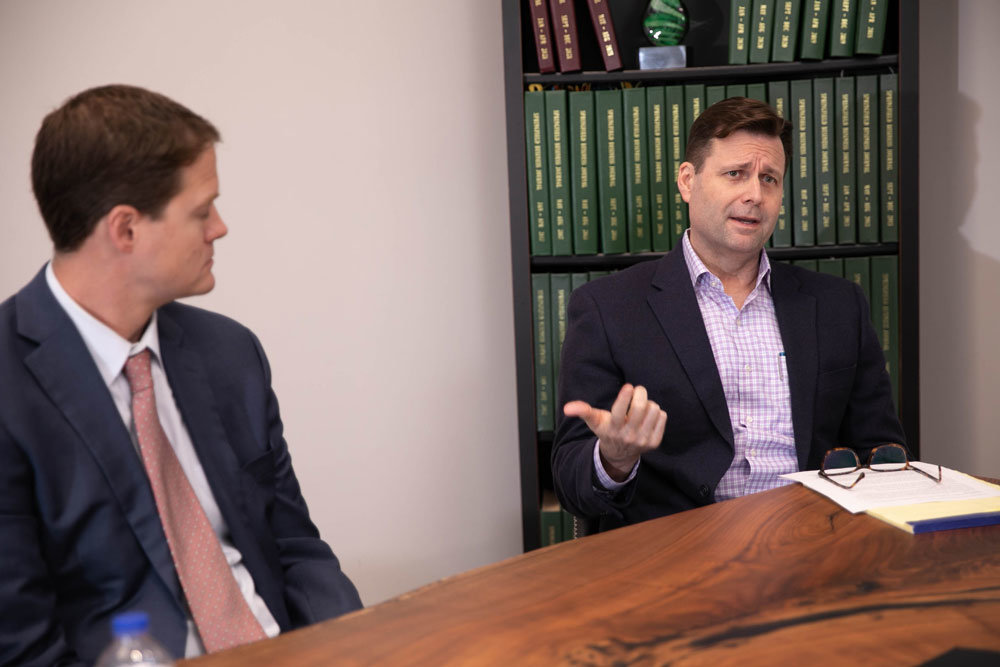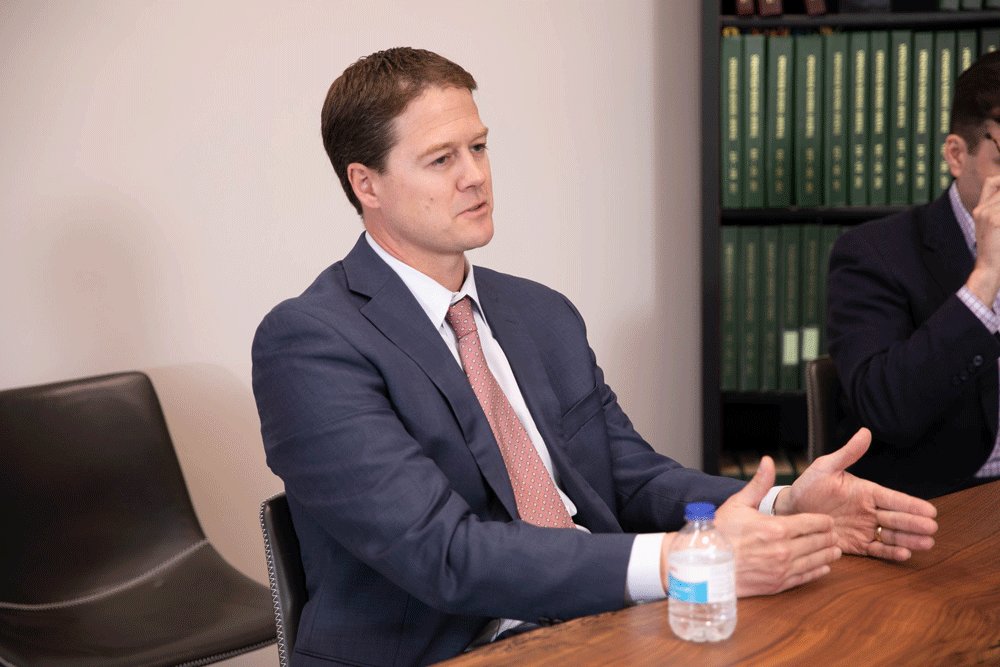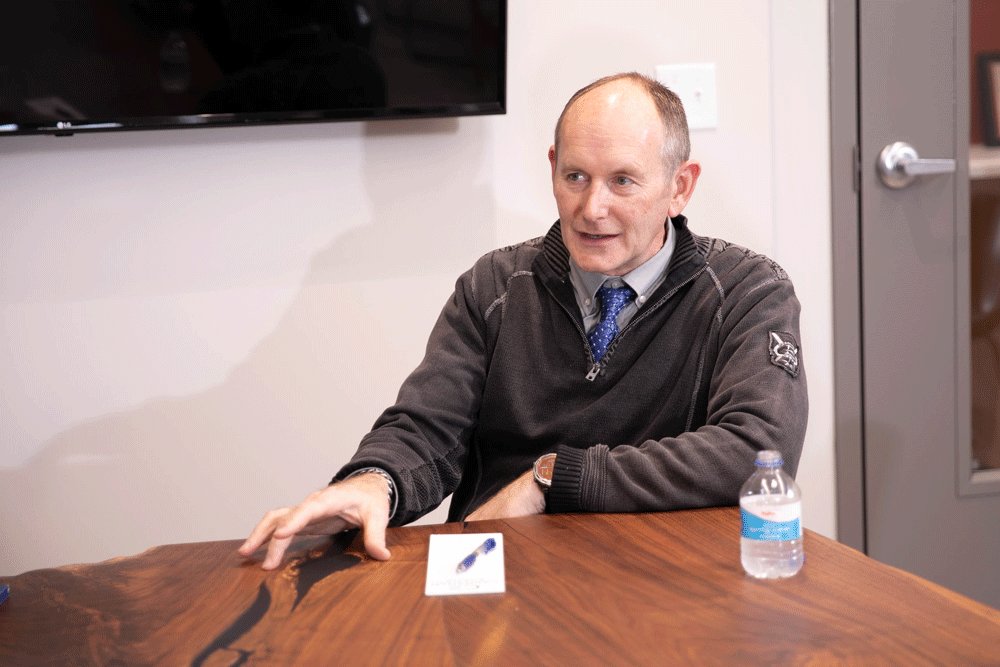YOUR BUSINESS AUTHORITY
Springfield, MO
YOUR BUSINESS AUTHORITY
Springfield, MO






Springfield Business Journal Executive Editor Christine Temple talks law with Christiaan Horton, shareholder at Carnahan Evans PC; Jason Smith, Springfield office managing partner at Spencer Fane LLP; and Bryan Wade, Springfield office managing partner at Husch Blackwell LLP.
Christine Temple: Let’s start with workforce, which is on every executive’s mind. A release from the National Association of Law Placement says recruitment in 2021 was the most robust we’ve seen in years for the summer associates, partially due to the fight for talent. How deep is the pipeline for new hires and attorneys overall?
Bryan Wade: I don’t know that there is the shortage of talent coming from the law schools; there’s just much more competition for that talent, and I think that’s driven by existing associate turnover. You’ll see third, fourth, fifth year associates decide they want to do something different, whether it be another law firm, or we see a lot of people just decide they want to go in a different direction with their careers. There’s a consistent need to continue that people pipeline.
Jason Smith: We face a little bit of a challenge in Springfield because we don’t have a law school here. As a general rule, people that go off to law school, they spend three years of their young adult life and a lot of times want to stay in that community where they go to law school. And like Bryan said, it’s the competition. It’s not only local competition, maybe from companies that are hiring in-house people, but it’s also from the bigger cities that can pay more to attract top talent.
Temple: Is that really what people are looking for, the salary?
Smith: I think a lot of law school graduates are because, keep in mind, the vast majority of people coming out of law school have a lot of student loan debt.
Christiaan Horton: Salary is a big driver. I’d say the other driver is the generation that is coming to us now has different expectations about the workplace environment. Back when I first started, it was very common to be basically expected to be there before the shareholders or partners arrived and to be there well after they left. The younger generation values their lifestyle and their lives more. They are looking not only for the salary, but what’s the whole experience I can expect from my commitment to working at this firm. And on the loyalty perspective, because that’s kind of like Bryan alluded to, what happens at that four- or five-year mark when they may decide to do something completely different – not uncommon for that rooted loyalty not to be quite as it used to be. If we pour all our resources into this individual, what is the likelihood that they’re going to be here four or five years, and maybe commit to a longer relationship with the firm? Just taking a new attorney on creates a cost for that firm.
Temple: Is part of asking more of the employer fueled by that competition and need for retention?
Horton: Employers realize that the top candidates, the top individuals, are special, and it’s going to take a little extra to get them.
Smith: I think it creates opportunity in a sense. Maybe we can’t pay what a firm in a Chicago or Dallas is going to pay, but can we offer some other benefits to those new attorneys?
Temple: What about support staff? Is that a challenge to find them?
Horton: Absolutely. More and more. When I started, Drury used to have a program, and they still may, for paralegal studies, and it was not uncommon to have students graduating out of that paralegal program and finding niches in the local law firms here. But it’s been a long time since I’ve known that there’s paralegals going through a local program. If there’s people out there that are doing that, find me because I’d like to talk with you. Have you all heard about that?
Smith: I haven’t. But certainly, law firms I don’t think are unique to the workforce struggles. We’ve seen it at my firm for sure, and I’ve had to try to come up with some creative ways to counter that.
Temple: Like what?
Smith: Pay and ability to work from home certain days of the week.
Wade: The National Association for Law Placement said the associate attrition rate for 2021 was 26%, which is the highest rate they’ve had since collecting data. So, that tells you about the churn that I was talking about. There’s just more movement. We’re starting over from scratch more often, and that creates competition, and the applicant benefits from that in many ways.
Litigation trends
Temple: What types of cases are you seeing or what parts of the firm are you seeing grow? When COVID-19 hit, the industry thought it would take a little bit for those lawsuits to start. Have those started yet?
Horton: I’m seeing more real estate litigation, and I’m seeing a little bit more construction litigation, because in that particular area we’ve had a boost for a while. The economy’s been hot in those areas. The economy doesn’t really affect my practice too much. If it’s good, people have resources to bring their claims and they’re willing to blow some gunpowder to do it. And when the economy is on a downswing, people are looking for money, and they may be looking inside of contracts or looking for ways to monetize some rights that they feel have been trampled on. In those areas where the economy is hot, usually I find that litigation is hot.
Smith: I would 100% agree. So, real estate and construction, there’s been a tremendous amount of litigation in those areas over the past few years. There is a lot of COVID litigation out there. It’s not maybe in the traditional sense that people would think of it. Like my grandma died in the nursing home of COVID. We’re going to sue the nursing home. I haven’t seen a lot of that type of stuff, but I am seeing cases where a business relationship has soured due to the effects of COVID that is now leading to a dispute.
Horton: Could be a supply chain issue. That’s big right now. There’s a lot of contracts that are almost in suspended performance because they can’t be performed. There’s challenges getting sometimes materials, labor, a lot of components that go into the entire process. It’s straining capital because clients can’t move their business like they need to move it. And they’re probably running out of excuses and promises. When you have that tension, it can spark litigation.
Wade: We’ve seen an uptick in commercial litigation, employment litigation, cybersecurity and data privacy, and class actions across the board. Lower activity in corporate bankruptcies and reorganizations. However, I guess if the interest rate environment changes, those could change, too.
Smith: Employment seems to always be busy. I tried an employment case last week. It seems like employment issues are always popping up.
Cyber risk
Temple: The Allianz Risk Barometer noted that the threat of cyberattacks was the biggest concern for companies globally this year. We’re all carrying around weapons in our hands and in our pockets. You probably saw Ozarks Technical Community College was robbed of $900,000 by a supposed vendor this spring. How do companies mitigate risk in this area?
Wade: I don’t know the details of OTC, but the allegations sounded horrible. Companies are looking at ways to obviously minimize the concern. One of those would be looking at board member opportunities who have some expertise in the area and then bolstering their IT departments and just having access to that expertise on the preventative side. Also, looking at the other side of it, if it happens, what recourses they have. They’re looking at their insurance coverages, they’re looking at ways to tighten up internal controls because sometimes these things happen, unfortunately, with employees. Identify the issue, hopefully prevent it and then understand what you need to do if it happens.
Smith: What Bryan said last is really important. As I understand it, a really critical component of this is having that plan in place. When you have the breach, does everyone know what they’re supposed to do? How quickly are they going to do it and contain it as much as possible?
Horton: One of the things that we did, it was a conscious decision about four years ago now, is we started pouring a lot of our firm resources into absolutely hardening our network because we had more remote access. We boosted our budget and came up with a plan that really, I think, now that it’s implemented, has really saved us because they’ve been able to stop some penetrations that could have otherwise, had we not taken these measures, maybe made their way through compromising our system and then putting us into the situation where we would’ve been susceptible to a ransom attack. Now that that is kind of an alert that most businesses are aware of, get to your IT expert, get to your outside vendor, take those extra budgetary measures to plan for that.
Temple: What’s some of the litigation associated with that?
Smith: As soon as you hear about a data breach, you’ll see class-action lawsuits filed the very next day. That’s probably the most prevalent litigation that you see stemming from that. I’m sure that those companies that are having their data breached are looking to point the finger at someone, whether that it’s an IT vendor or someone else.
Emerging practices
Temple: Husch Blackwell started a Psychedelics and Emerging Therapies Practice Group this spring, which I was a little surprised to see but also makes sense when you research how prevalent these therapies are becoming. What was behind that?
Wade: It is interesting. You see more of the post-traumatic stress disorder diagnoses, and you see also that to treat those disorders, there are multiple drug therapies that are available. Some of those are being deregulated and they’re becoming more mainstream. That impacts just all kinds of relationships, whether it’s employer/employee or companies going to market with a product. The group is related to more so representing the companies that are going to market with those deregulated therapies. It certainly will impact your other practice groups that deal with those things, either in the labor and employment portions or contracts. It is an interesting niche, but it probably will become part of the mainstream legal support.
Temple: On emerging industries, Carnahan Evans has its medical marijuana practice group. Recreational marijuana will likely be on the ballot in November, which would bring about a new way of thinking for businesses and a whole new perhaps focus for the firm. How are you preparing?
Horton: I know right now that our practice group is watching the activity to get that measure on the ballot very closely. In outstate Missouri, that is going to be a very challenging measure to approve, but I think depending on Kansas City, St. Louis, maybe Columbia, some of the turnouts in some of those other metropolitan areas that could be more supportive of that could be determinative. The question will be what that turnout is going to look like politically. Our practice group is working hard to prepare in the event that the measure would pass because I think it’s going to create a whole host of questions for people that want to know more about the regulatory process.
Smith: We’re doing whatever we have to do to be prepared. I think everyone sitting at this table probably has multiple clients that are in this space. This is a train that’s not coming to a stop anytime soon.
Temple: Other emerging practice fields? I think of cryptocurrency.
Wade: Bitcoin definitely is an emerging field. I’m not sure how or if it will become heavily regulated. But it is also something that businesses have questions about.
Smith: I would say social media. Both from the standpoint of representing the companies that use social media for their marketing, but also representing all of the YouTube sensations out there and the social media superstars that have all of the sudden become quite successful.
Horton: What’s amazing to me is how people, your everyday common person, if they can figure out what might be interesting to the public at large, they can monetize that and make an absolute excellent living through social media. I was dealing with a client not long ago who just started some home YouTube videos, like a how-to type of video session. I was shocked at how much money she’s making in three or four years’ time. The income that she’s generating from these relationships that she’s built up through her online presence is amazing. For many people earning half a million dollars from your home doing home videos of things you love to do, that’s a career choice. We’re on the verge of seeing just exactly what potential is out there.
Temple: Is that representation protecting the content they’re creating, or how are you advising them?
Horton: There’s definite ideas on the protection of content. There’s also relationships that need to be forged hopefully in writing so there’s no misunderstandings on divisions and splits of revenue going forward in the future. No different than the music industry, which is a very complicated business when it comes to the sharing of royalties and revenues off of originally created work. This is originally created work on YouTube that has authorship to it. What happens when that work gets duplicated? There’s a level of obvious copyright protection and vigilance that each person must have.
Smith: I think that’s the unique thing about it from the perspective of a Springfield, Missouri, law practice. Anybody anywhere can be a star. You don’t have to be in L.A. or New York; you don’t have to be in Nashville. You can be right here, and there are plenty of them that have legal needs.
Firm operations
Temple: Within your businesses, what are the biggest challenges and opportunities? What’s new and next? I know Carnahan Evans had a big year with its rebrand.
Horton: Yes. The biggest challenge for us is the transition of leadership at our firm because we’ve had several of our founding partners retire recently. We still have several of those founding shareholders still here practicing. But looking five to 10 years down the road, there’s going to be a transition of that knowledge base. Our firm was founded as basically a business tax firm, so a lot of our older attorneys not only have their Juris doctorate degree, but they also have their LLM in taxation. That is a unique area of the law, tax law. I don’t have an LLM, I don’t think you guys do, but tax law is becoming more and more challenging to master and it’s always changing. One of our firm’s challenges is how do we make sure that the clients that have come to expect our tax advice and expertise can count on us for that? We’ve got plans in place to make sure that we’ve got the talent.
Wade: In addition to continuing our traditional, organic growth, we’ve also established something called The Link, which is a completely remote practice. That sort of originated from the COVID pandemic when everyone was working remotely. What we discovered, and I think most law firms discovered, is that they can be productive from home given the technology. So, springing from that idea, we’ve established this Link. We have a managing partner of The Link. All those persons that have decided to join The Link operate from somewhere other than a brick-and-mortar office. One of the things that that’s created is the opportunity for recruitment of lawyers from places where we don’t have a brick-and-mortar office, like Little Rock or New York. In fact, there are a couple people that live in Springfield or the Branson area near the lake who are in The Link, but not affiliated with the Springfield office, which is kind of interesting.
Temple: Were they previously?
Wade: One was. But most of these folks were recruited by the independent group.
Smith: Now I get to pick on Bryan because this is part of the workforce challenge, firms that are creating these virtual offices. Recruiting people to work full-time online, that’s a challenge for those offices of ours that do want people in the office.
Temple: Is your firm not willing to allow people to be fully remote?
Smith: We don’t currently have any type of plan in place for people to be 100% remote. But the challenge on the workforce issue being in Springfield, though, is other firms with bigger footprints or national firms can do exactly what Husch Blackwell is doing and they can come in and they can recruit people that may be in Springfield that are working for one of our existing firms and they can say we’ll pay you substantially more money because you’ll be working on our national projects. But you can keep living in Springfield.
Excerpts by Executive Editor Christine Temple, ctemple@sbj.net.
Other stories that may interest you
Connected to Watkins Elementary School is a new storm shelter now under construction.
STL construction firm buys KC company
Updated: Systematic Savings Bank to be acquired in $14M deal
Webster University's deficit triples
Missouri House speaker accused of obstruction in ethics probe
‘Dress for your day’: Companies are relaxing dress codes amid evolving ideas about fashion
Developer targets opening by month's end for $10M apartment complex

